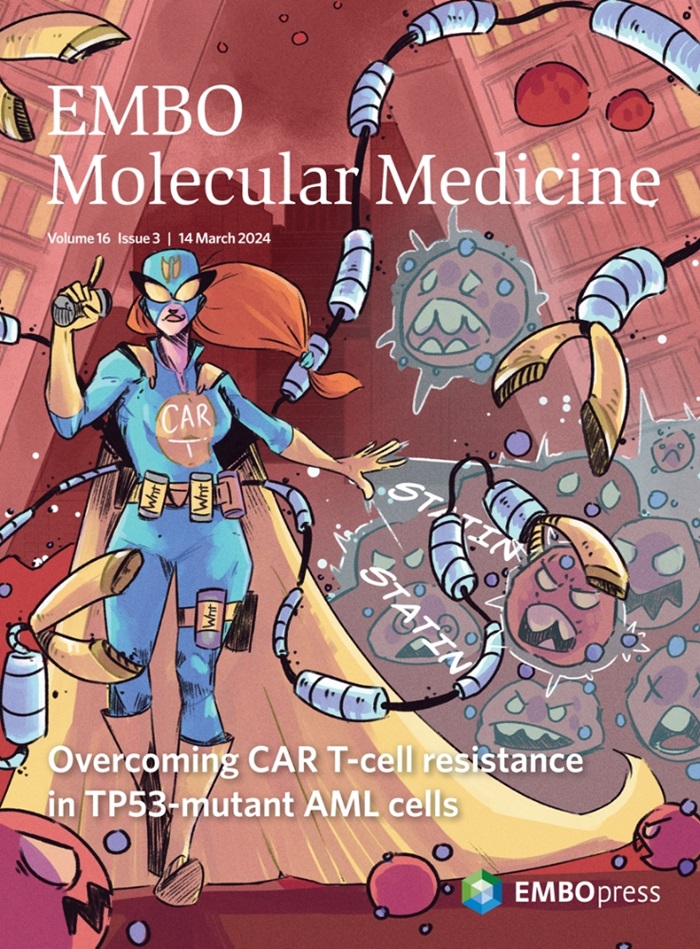JAK/STAT抑制可保护糖皮质激素受体敲除小鼠免于疟疾致死性低血糖和高炎症。
IF 9
1区 医学
Q1 MEDICINE, RESEARCH & EXPERIMENTAL
引用次数: 0
摘要
疾病耐受性是一种关键的防御机制,可以在不直接降低病原体水平的情况下限制对宿主的损害。在疟疾方面,这些机制对于预防严重疾病和死亡至关重要,但人们对其了解甚少。在这项研究中,我们发现糖皮质激素受体(GR)介导的过程在chabaudi AS感染的疾病耐受中起着至关重要的作用。受感染小鼠的GR缺失导致致死性低血糖和细胞因子风暴。低血糖是由肝脏和脾脏严重的代谢功能障碍驱动的,其特征是葡萄糖摄取增加、糖原消耗、糖酵解谱和糖异生基因表达减少。重要的是,这种低血糖状态与JAK/STAT通路的过度激活和细胞因子的过度表达密切相关。JAK1/2抑制剂ruxolitinib通过预防致死性低血糖和抑制高炎症显著提高生存率。我们的研究结果揭示了严重疟疾期间GR信号、STAT3激活、细胞因子表达和葡萄糖代谢之间的新联系。这强调了gr介导的过程在疾病耐受性中的关键作用,并突出了ruxolitinib作为一种有希望的辅助治疗来控制疟疾中危及生命的代谢并发症。本文章由计算机程序翻译,如有差异,请以英文原文为准。
JAK/STAT inhibition protects glucocorticoid receptor knockout mice from lethal malaria-induced hypoglycemia and hyperinflammation.
Disease tolerance is a key defense mechanism that limits damage to the host without directly reducing pathogen levels. In malaria, these mechanisms are essential for preventing severe disease and death but remain poorly understood. In this study, we show that glucocorticoid receptor (GR)-mediated processes play a vital role in disease tolerance during Plasmodium chabaudi AS infection. GR deletion in infected mice resulted in lethal hypoglycemia and a cytokine storm. Hypoglycemia was driven by severe metabolic dysfunction in the liver and spleen, characterized by increased glucose uptake, glycogen depletion, a dominant glycolytic profile and reduced gluconeogenic gene expression. Importantly, this hypoglycemic state was strongly associated with overactivation of the JAK/STAT pathway and excessive cytokine expression. Treatment with the JAK1/2 inhibitor ruxolitinib significantly improved survival by preventing lethal hypoglycemia and suppressing hyperinflammation. Our findings reveal a novel link between GR signaling, STAT3 activation, cytokine expression and glucose metabolism during severe malaria. This underscores the critical role of GR-mediated processes in disease tolerance and highlights ruxolitinib as a promising adjuvant therapy for managing life-threatening metabolic complications in malaria.
求助全文
通过发布文献求助,成功后即可免费获取论文全文。
去求助
来源期刊

EMBO Molecular Medicine
医学-医学:研究与实验
CiteScore
17.70
自引率
0.90%
发文量
105
审稿时长
4-8 weeks
期刊介绍:
EMBO Molecular Medicine is an open access journal in the field of experimental medicine, dedicated to science at the interface between clinical research and basic life sciences. In addition to human data, we welcome original studies performed in cells and/or animals provided they demonstrate human disease relevance.
To enhance and better specify our commitment to precision medicine, we have expanded the scope of EMM and call for contributions in the following fields:
Environmental health and medicine, in particular studies in the field of environmental medicine in its functional and mechanistic aspects (exposome studies, toxicology, biomarkers, modeling, and intervention).
Clinical studies and case reports - Human clinical studies providing decisive clues how to control a given disease (epidemiological, pathophysiological, therapeutic, and vaccine studies). Case reports supporting hypothesis-driven research on the disease.
Biomedical technologies - Studies that present innovative materials, tools, devices, and technologies with direct translational potential and applicability (imaging technologies, drug delivery systems, tissue engineering, and AI)
 求助内容:
求助内容: 应助结果提醒方式:
应助结果提醒方式:


